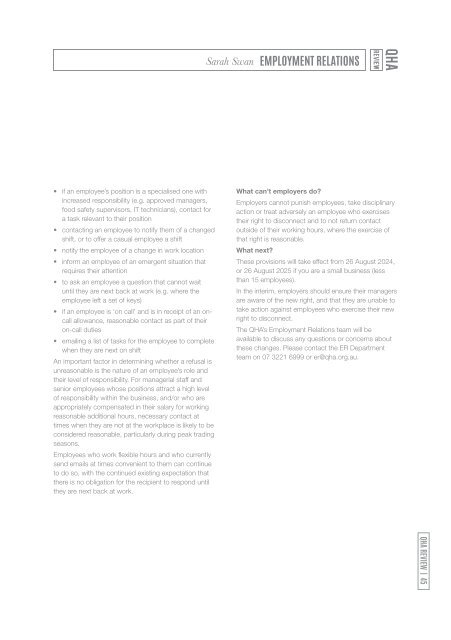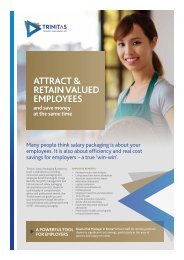QHA-Review_April_Digital
- No tags were found...
Create successful ePaper yourself
Turn your PDF publications into a flip-book with our unique Google optimized e-Paper software.
Sarah Swan<br />
EMPLOYMENT RELATIONS<br />
• if an employee’s position is a specialised one with<br />
increased responsibility (e.g. approved managers,<br />
food safety supervisors, IT technicians), contact for<br />
a task relevant to their position<br />
• contacting an employee to notify them of a changed<br />
shift, or to offer a casual employee a shift<br />
• notify the employee of a change in work location<br />
• inform an employee of an emergent situation that<br />
requires their attention<br />
• to ask an employee a question that cannot wait<br />
until they are next back at work (e.g. where the<br />
employee left a set of keys)<br />
• if an employee is ‘on call’ and is in receipt of an oncall<br />
allowance, reasonable contact as part of their<br />
on-call duties<br />
• emailing a list of tasks for the employee to complete<br />
when they are next on shift<br />
An important factor in determining whether a refusal is<br />
unreasonable is the nature of an employee’s role and<br />
their level of responsibility. For managerial staff and<br />
senior employees whose positions attract a high level<br />
of responsibility within the business, and/or who are<br />
appropriately compensated in their salary for working<br />
reasonable additional hours, necessary contact at<br />
times when they are not at the workplace is likely to be<br />
considered reasonable, particularly during peak trading<br />
seasons.<br />
Employees who work flexible hours and who currently<br />
send emails at times convenient to them can continue<br />
to do so, with the continued existing expectation that<br />
there is no obligation for the recipient to respond until<br />
they are next back at work.<br />
What can’t employers do?<br />
Employers cannot punish employees, take disciplinary<br />
action or treat adversely an employee who exercises<br />
their right to disconnect and to not return contact<br />
outside of their working hours, where the exercise of<br />
that right is reasonable.<br />
What next?<br />
These provisions will take effect from 26 August 2024,<br />
or 26 August 2025 if you are a small business (less<br />
than 15 employees).<br />
In the interim, employers should ensure their managers<br />
are aware of the new right, and that they are unable to<br />
take action against employees who exercise their new<br />
right to disconnect.<br />
The <strong>QHA</strong>’s Employment Relations team will be<br />
available to discuss any questions or concerns about<br />
these changes. Please contact the ER Department<br />
team on 07 3221 6999 or er@qha.org.au.<br />
<strong>QHA</strong> REVIEW | 45
















